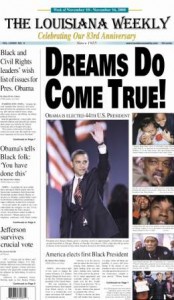Louisiana Weekly: Fulfilling the Dream of Civil Rights Activists
Posted on November 15, 2012 in Uncategorized, Underrepresented by Meredith
The emergence of African American newspapers forever gave African Americans a voice, even though not always loud or powerful, a voice nonetheless. Coming from the birth of the nation where “It is difficult to fathom the kind of limitations on speech that were imposed on African Americans” (The Press page 84), a media outlet exclusively available to African Americans is a great stride in civil rights.

Today, African American newspapers still function similarly as they did in the 1960’s, catering to the African American community, and raising awareness of injustices to their race. In the Louisiana Weekly, based in New Orleans, there are sections such as Entertainment, and Classifieds but also article dealing with major issues such as racial profiling and unfair treatment of blacks in the workplace. I found an article called “The Hard Truth.. Recognizing the face of evil” by Min. J. Kojo Livingston. It comments very heavily on racism of African Americans, and cites America as “a nation built on lies, theft, and oppression.” The freedom of speech allows for negative comments about out country, even if it may be looked bad upon in conventional main strem media. And African Americans, after their years of oppression, have gained the right to publish what they like, even if it may be against the foundations of our government. The important thing about African American newspapers in the past and today is that they allows African Americans to publish what otherwise might not be published in a main stream media outlet. Mainly because of the constraints of the media we have learned about throughout our class, such as demographics, fear of loss of revenue and competition between media outlets.
Overall, I believe that the one of the main goals of journalism, to serve as a function of the common good, lives within African American newspapers. Which I also believe was ultimate dream for African American newspapers by popular advocates of this cause such as Frederick Douglas and Ida Wells.






